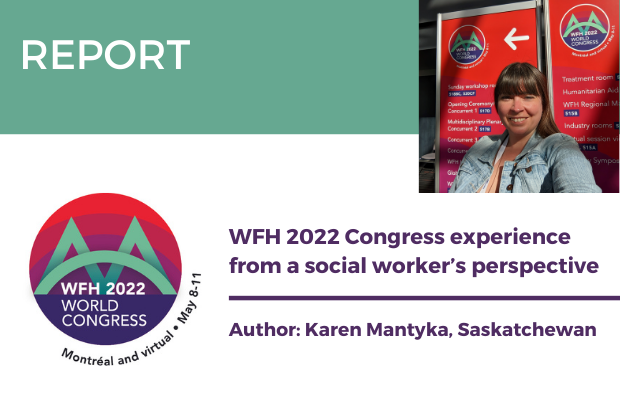WFH 2022 Congress experience from a social worker’s perspective

by Karen Mantyka, Social worker, Saskatchewan Bleeding Disorders Program
This year marked the 35th WFH World Congress, which was held in Montreal, Canada where thousands of people attended, both in person and virtually. I began working in December 2021 as the social worker for the Saskatchewan Bleeding Disorders Program and as someone who is new to the field, this experience was invaluable to begin understanding the experiences, needs and medical advancements that have been happening in the community.
There were too many topics to cover them all, from where things stand on a global platform, to evaluating chronic pain, to new definitions and assessments for women and bleeding disorders. And, of course, Covid-19 and its effects on clinics, parenting and access to support was addressed as well. Many healthcare providers had to shift to virtual care, which had its pros and cons. Brian O’Mahony, CEO of the Irish Haemophilia Society, talked about the benefits of increased use of technology and home delivery of medications, while noting limitations such as missed networking opportunities or how patients felt their care was impacted. The changes in medical care, as well as the isolation experienced by many has created new challenges for people, especially in relation to mental health.
Chris Bombardier, Executive Director of Save One Life, United States, spoke of his triumph in climbing some of the world’s tallest mountains, all while battling needle phobia and the feeling that he was not enough. He spoke of working with his therapist to avoid the “Happiness Trap,” which is the idea that external success SHOULD lead to happiness (but often it does not). Chris bravely opened up about his mental health during this talk and the strategies he uses to deal with it – like reframing his experiences and mindfulness exercises during his prophylaxis treatments. This discussion later inspired others to speak out as well. Like Nikole Scappe, Manager of Education at the National Hemophilia Foundation, United States, who voiced her anxiety around the many hospital visits she has had throughout her life and talked about how the smell of vinegar can now trigger this anxiety. There is a transformative power in sharing our experiences with others, as it was noted in the session on “Memorial Art,” during which speakers shared their stories of love and loss.
With the changing landscape of medications and gene therapy, more people are living longer lives and having a better quality of life. Many of the sessions discussed the value of “shared care”, or the collaborative approach to healthcare, where patients, doctors, and other healthcare professionals work together to improve care for people with chronic health conditions. But as noted by Simon Fletcher, Lead Haemophilia Research Nurse at the Oxford Haemophilia and Thrombosis Centre, United Kingdom, this needs to always happen in partnership with the patient, as they are the experts of their bodies and lives.
The congress truly provided a platform for many people with valuable life experience to express the challenges and successes associated with living with a bleeding disorder.
What I appreciated most is how very open and welcoming this community has been. People were very willing to answer my questions and share their stories, which is an honor. I am looking forward to the next World Congress in 2024!




